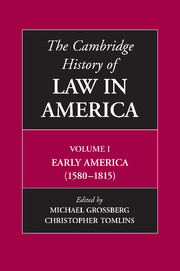Book contents
- Frontmatter
- 1 Law, Colonization, Legitimation, and the European Background
- 2 The Law of Native Americans, to 1815
- 3 English Settlement and Local Governance
- 4 Legal Communications and Imperial Governance: British North America and Spanish America Compared
- 5 Regionalism in Early American Law
- 6 Penality and the Colonial Project: Crime, Punishment, and the Regulation of Morals in Early America
- 7 Law, Population, Labor
- 8 The Fragmented Laws of Slavery in the Colonial and Revolutionary Eras
- 9 The Transformation of Domestic Law
- 10 Law and Religion in Colonial America
- 11 The Transformation of Law and Economy in Early America
- 12 Law and Commerce, 1580–1815
- 13 Law and the Origins of the American Revolution
- 14 Confederation and Constitution
- 15 The Consolidation of the Early Federal System, 1791–1812
- 16 Magistrates, Common Law Lawyers, Legislators: The Three Legal Systems of British America
- Bibliographic Essays
- Notes on Contributors
- Index
- References
4 - Legal Communications and Imperial Governance: British North America and Spanish America Compared
Published online by Cambridge University Press: 28 November 2008
- Frontmatter
- 1 Law, Colonization, Legitimation, and the European Background
- 2 The Law of Native Americans, to 1815
- 3 English Settlement and Local Governance
- 4 Legal Communications and Imperial Governance: British North America and Spanish America Compared
- 5 Regionalism in Early American Law
- 6 Penality and the Colonial Project: Crime, Punishment, and the Regulation of Morals in Early America
- 7 Law, Population, Labor
- 8 The Fragmented Laws of Slavery in the Colonial and Revolutionary Eras
- 9 The Transformation of Domestic Law
- 10 Law and Religion in Colonial America
- 11 The Transformation of Law and Economy in Early America
- 12 Law and Commerce, 1580–1815
- 13 Law and the Origins of the American Revolution
- 14 Confederation and Constitution
- 15 The Consolidation of the Early Federal System, 1791–1812
- 16 Magistrates, Common Law Lawyers, Legislators: The Three Legal Systems of British America
- Bibliographic Essays
- Notes on Contributors
- Index
- References
Summary
Strategies and practices for the communication of law were vital to England’s capacity to govern its North American colonies. A diverse array of mechanisms for exchange of legal information characterized the expanding English empire – Crown instructions to governors, Privy Council review of colonial legislation and appellate cases, petitioning, the stationing of colony agents in London and royal officials in America, the training or immigration of lawyers, the transmission of information through lobbying and interest groups, the discussion of law in congregations and universities, and publication by the linked media of print, manuscript, and speech. Here I use the protean concept of “legal communications” to bundle together several distinguishable practices both to achieve breadth and to demonstrate their interrelationships.
In what ways did legal communications in the seventeenth- and eighteenth-century Anglo-American world affect imperial governance? First, the strengthening of English oversight of the colonies after the Restoration required the cultivation of an assortment of legal communications techniques. We are already quite familiar with the general growth and functioning of imperial institutions and trans-Atlantic politics that this entailed. Here, I explore the variety of different roles that legal communications played in tying the empire together administratively and intellectually. This exploration provides the basis for the chapter’s second and more extensive part, which advances the main argument. In that second part, we see that the empire’s communications practices actually had a double nature. Although they facilitated greater imperial oversight, they also inadvertently shielded a significant measure of local control and diversity in the colonial legal systems themselves.
- Type
- Chapter
- Information
- The Cambridge History of Law in America , pp. 104 - 143Publisher: Cambridge University PressPrint publication year: 2008
References
- 12
- Cited by



